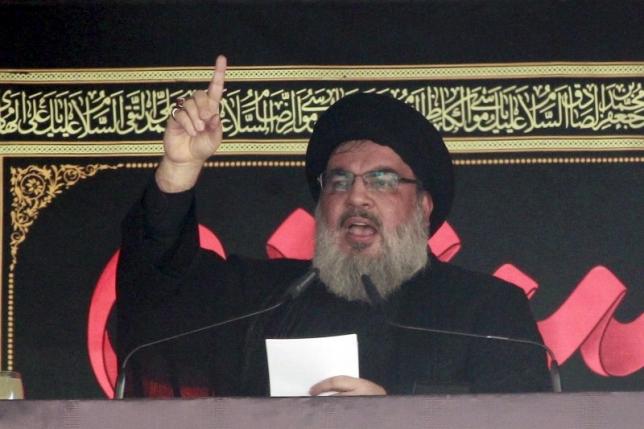Hezbollah sees new struggle in Lebanon, denounces Saudi Arabia
BEIRUT: Hezbollah said on Tuesday that Lebanon had been pushed into a new phase of political conflict by Saudi Arabia but was not on the brink of civil war and its government of national unity should survive.
Sayyed Hassan Nasrallah, head of the Iranian-backed group, also stepped up criticism of Saudi Arabia, accusing it of directing car bombings in Lebanon, an arena for sectarian-tinged Iranian-Saudi rivalry that is escalating across the Middle East.
Saudi Arabia had no immediate response to the accusation.
Relations between Lebanon and Saudi Arabia have been plunged into crisis since Riyadh halted $3 billion in aid to the Lebanese army - a response to the Beirut government's failure to condemn attacks on Saudi diplomatic missions in Iran.
The row has raised concern for Lebanon's political and economic stability by exacerbating tensions between its Sunni and Shi'ite Muslims and prompting concerns about the livelihoods of hundreds of thousands of Lebanese expatriates the Gulf.
Tensions spilled into the streets on Saturday night when a Saudi-owned TV station aired a show mocking Nasrallah that led the group's supporters to block roads with burning tyres.
"It is clear that since ... the announcement to halt grants and other Saudi measures we have entered a new phase of political and media struggle which Saudi Arabia has escalated," Nasrallah said.
The aim of Saudi policy was to force Lebanese to confront Hezbollah to force it to retreat "even if this leads to strife in Lebanon, the collapse of the government in Lebanon, to a civil war in Lebanon", Nasrallah said. "Saudi doesn't care."
"We see that the continuation of the government is a national interest and we do not intend to resign from it."
Sunni-led Saudi Arabia wields big influence in Lebanon through its backing for Sunni politician Saad al-Hariri, a former prime minister who said on Tuesday that "riots, road blocking and tyre burning" were attempts to provoke "chaos and discord". "We should not be dragged to any attempt of this sort," he said.
Tension between Hezbollah and Hariri spilled into armed conflict as recently as 2008, when a political dispute fuelled by Saudi-Iranian rivalry triggered a brief civil war. Nasrallah said there would be no repeat of that conflict.
"We don't want to turn the table on anyone. We want this table to remain," he said in reference to dialogue between Hezbollah and Hariri's Future Movement. He said Hezbollah had nothing to do with recent street protests, telling his supporters there was "no need to go into the streets".
"I ask you not to go out," he said.
Saudi Arabia and other Gulf states have advised citizens against travel to Beirut. Riyadh last week blacklisted four companies and three Lebanese men for having links to Hezbollah.
"REAL JIHAD"
Yemen's Gulf-backed government has accused Hezbollah of training and fighting alongside Houthi forces in that country's war and of planning attacks in Saudi Arabia. Iran and Hezbollah deny accusations they have provided military aid to the Houthis.
Even with regional upheaval, Lebanon has so far avoided the kind of all-out war under way in Yemen or Syria, where Hezbollah is fighting on the side of President Bashar al-Assad. But political conflict has paralysed the Lebanese government and the country has been without a head of state for nearly two years.
Underlining the depth of hostilities, Nasrallah described an anti-Saudi speech he gave last year after the start of its military intervention in Yemen as the "most honourable thing I have done in my life ...
"I feel this is the real jihad," he said, calling it "greater than the July war" - a reference to Hezbollah's month-long conflict with Israel in 2006.
He also accused Saudi Arabia of overseeing car bomb attacks in the predominantly Shi'ite southern suburbs of Beirut and elsewhere in Lebanon. The last such attack in the southern suburbs was in November and claimed by Islamic State militants.






